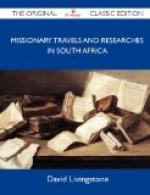Livingstone, as befits his profession, regards his discoveries from a religious stand-point. “The end of the geographical feat,” he says, “is the beginning of the missionary enterprise.” But he is a philosopher as well as a preacher, recognizing as true missionaries the man of science who searches after hidden truths, the soldier who fights against tyranny, the sailor who puts down the slave-trade, and the merchant who teaches practically the mutual dependence of the nations of the earth. His idea of missionary labor looks to this world as well as the next. Had the Bakwains possessed rifles as well as Bibles—had they raised cotton as well as attended prayer-meetings—it would have been better for them. He is clearly of the opinion that decent clothing is of more immediate use to the heathen than doctrinal sermons. “We ought,” he says, “to encourage the Africans to cultivate for our markets, as the most effectual means, next to the Gospel, of their elevation.” His practical turn of mind suffers him to present no fancy pictures of barbarous nations longing for the Gospel. His Makololo friends, indeed, listened respectfully when he discoursed of the Saviour, but were all earnestness when he spoke of cotton cloths and muskets. Sekeletu favored the missionary, not as the man who could give him Bibles and tracts, but as the one by whose help he hoped to sell his ivory for a rifle, a sugar-mill, and brass wire.
Livingstone’s missionary scheme is accommodated to the actual state of things. It rests quite as much upon traders as preachers. He would open a communication by the Zambesi to the heart of the continent. Upon the healthy, elevated region overlooking the low, fertile basin he would establish trading posts, supplied with European wares. We can not wonder that the directors of the Missionary Society looked coldly upon this scheme, and wrote to him that they were “restricted in their power of aiding plans connected only remotely with the spread of the Gospel;” nor can we regret that Livingstone, feeling his old love of independence revive, withdrew from his connection with the Society, for the purpose of carrying out his own plans. With all respect for the worthy persons who manage missionary societies, we can not but believe that the man who led so large a party across the African continent will accomplish more for the good cause when working out his own plans than he would do by following out their ideas.
Appendix.—Notes to etext.
Words:
The names Loanda and Zambesi are given in most modern texts as Luanda and Zambezi.
In three cases, the spelling used in the original was distracting enough that it has been changed: musquito > mosquito, hachshish > hashish, and nomade > nomad.
In three other cases, two variant spellings of a word were used in the text. These were made uniform in accordance with the modern standard. They were: water-buck > waterbuck, Mosambique > Mozambique, and imbody > embody.




